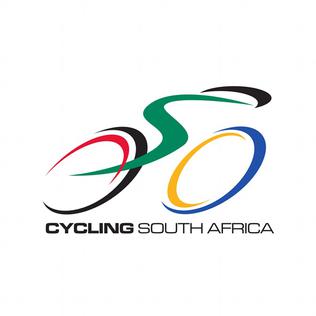
BMX, an abbreviation for bicycle motocross or bike motocross, is a cycle sport performed on BMX bikes, either in competitive BMX racing or freestyle BMX, or else in general street or off-road recreation.

The Union Cycliste Internationale is the world governing body for sports cycling and oversees international competitive cycling events. The UCI is based in Aigle, Switzerland.

BMX racing is a type of off-road bicycle racing. The format of BMX was derived from motocross racing. BMX bicycle races are sprint races on purpose-built off-road single-lap race tracks. The track usually consists of a starting gate for up to eight racers, a groomed, serpentine, dirt race course made of various jumps and rollers and a finish line. The course is usually about 15 feet (4.6 m) wide and has large banked corners, which are angled inward, that help the riders maintain speed. The sport of BMX racing is facilitated by a number of regional and international sanctioning bodies. They provide rules for sanctioning the conduct of the flying, specify age group and skill-level classifications among the racers, and maintain some kind of points-accumulation system over the racing season. The sport is very family oriented and largely participant-driven, with riders ranging in age from 2 to 70, and over. Professional ranks exist for both men and women, where the age ranges from 17 to over 40 years old.

Cyclo-cross is a form of bicycle racing. Races typically take place in the autumn and winter, and consist of many laps of a short course featuring pavement, wooded trails, grass, steep hills and obstacles requiring the rider to quickly dismount, carry the bike while navigating the obstruction and remount. Races for senior categories are generally between 40 minutes and an hour long, with the distance varying depending on the ground conditions. The sport is strongest in the traditional road cycling countries such as Belgium, France and the Netherlands.

Cycle sport is competitive physical activity using bicycles. There are several categories of bicycle racing including road bicycle racing, cyclo-cross, mountain bike racing, track cycling, BMX, and cycle speedway. Non-racing cycling sports include artistic cycling, cycle polo, freestyle BMX and mountain bike trials. The Union Cycliste Internationale (UCI) is the world governing body for cycling and international competitive cycling events. The International Human Powered Vehicle Association is the governing body for human-powered vehicles that imposes far fewer restrictions on their design than does the UCI. The UltraMarathon Cycling Association is the governing body for many ultra-distance cycling races.

British Cycling is the main national governing body for cycle sport in Great Britain. It administers most competitive cycling in Great Britain, the Channel Islands and the Isle of Man. It represents Britain at the world body, the Union Cycliste Internationale (UCI) and selects national teams, including the Great Britain (GB) Cycling Team for races in Britain and abroad. As of 2020, it has a total membership of 165,000.

Mountain bike racing is the competitive cycle sport discipline of mountain biking held on off-road terrain. The Union Cycliste Internationale (UCI) recognised the discipline relatively late in 1990, when it sanctioned the world championships in Durango, Colorado. The first UCI Mountain Bike World Cup series took place in 1988. Its nine-race circuit covered two continents—Europe and North America—and was sponsored by Grundig. Cross-country racing was the only World Cup sport at this time. In 1993, a six-event downhill World Cup was introduced. In 1996, cross-country mountain biking events were added to the Olympic Games. In 2006, cross-country mountain biking events became part of the World Deaf Cycling Championships for the first time in San Francisco, USA.

Scottish Cycling, legally the Scottish Cyclists' Union (SCU), is the governing body for cycle sport in Scotland and is part of British Cycling, the national governing body in Britain.

USA Cycling or USAC, based in Colorado Springs, Colorado, is the national governing body for bicycle racing in the United States. It covers the disciplines of road, track, mountain bike, cyclo-cross, and BMX across all ages and ability levels. In 2015, USAC had a membership of 61,631 individual members.

The Union Européenne de Cyclisme is the European confederation of national cycling bodies; the national federations of the Union Cycliste Internationale form confederations by continent. It is headquartered in Lausanne. In reaction to the 2022 Russian invasion of Ukraine, the UEC announced that Russia and Belarus officials will not be able to officiate at any UEC event, or attend or take part in any UEC meeting, committee, or forum.
Cycling New Zealand, originally known as BikeNZ, is the national governing body for cycling organisations in New Zealand, and represents the interests of BMX NZ, Cycling New Zealand Road & Track, Mountain Bike NZ, and Cycling New Zealand Schools. Cycling New Zealand covers the disciplines of road, track, mountain bike, cyclo-cross, BMX, BMX freestyle, e-cycling sports, para-cycling, and recreational and commuter riding.

The German Cycling Federation or BDR is the national governing body of cycle racing in Germany.

Cycling South Africa or Cycling SA is the national governing body of cycle racing in South Africa. Cycling SA is a member of the Confédération Africaine de Cyclisme and the Union Cycliste Internationale (UCI). It is affiliated to the South African Sports Confederation and Olympic Committee (SASCOC), as well as the Department of Sport and Recreation SA. Cycling South Africa regulates the five major disciplines within the sport, both amateur and professional, which include: road cycling, mountain biking, BMX biking, track cycling and para-cycling.

The UCI world championships are annual competitions promoted by the Union Cycliste Internationale (UCI) to determine world champion cyclists. They are held in several different styles of racing, in a different country each year. Championship winners wear a white jersey with coloured bands around the chest for the following year. The similarity to the colours of a rainbow gives them the colloquial name of "the rainbow jersey." The first three individuals or teams in each championship win gold, silver and bronze medals. Former world champions are allowed to wear a trim to their collar and sleeves in the same pattern as the rainbow jersey.
Corine Stam-Dorland was a Dutch amateur "Old School" Bicycle Motocross (BMX) racer whose prime competitive years were from 1981-1996. From 1996 to 2006 she was also an accomplished Mountain Bike (MTB) Cyclo-cross and Road Bike racer. Her nickname during her BMX career was "The Queen of BMX", largely for her nearly unbroken streak of a total of ten World Champions, several European Championships and an almost equal number of National championships from when she was eight years old until she was 21. She was to Holland and European BMX as a whole as Cheri Elliott was to American BMX. Indeed, her career was much longer than Elliott's garnering far more titles on the local, national and international level than her near contemporary American counterpart. Dorland would go on to a respected MTB cross country (XC) racing career. In that sub-discipline Dorland would capture three national titles in MTB and earn a spot on Holland's 2000 Sydney, Australia Olympic team. She also went on to fulfill a prediction that many had made for her in another area. Because of her stunning physical beauty, she was also a model in her adult years concurrent with her MTB career. She appeared in many racing related advertisements. As with Elliott in the United States, many a male BMXer was sad to see her retire from the world of BMX.

Santini SMS is a cycling clothes brand of the Italian clothing production company Santini Maglificio Sportivo. This company was founded by Pietro Santini in 1965 and is based in Lallio, Italy.
Mountain Bike Australia (MTBA) was the peak body responsible for the governance, promotion and advocacy of mountain biking in Australia. MTBA gained National Sporting Organisation (NSO) status from the Australian Sports Commission (ASC) in November 2017.

Botswana Cycling Association or BCA is the national governing body of cycle racing in Botswana. Botswana Cycling Association is a member of the Confédération Africaine de Cyclisme and the Union Cycliste Internationale (UCI). It is affiliated to the Botswana National Olympic Committee (BNOC), as well as the Botswana National Sports Commission. Botswana Cycling Association regulates the five major disciplines within the sport, both amateur and professional, which include: road cycling, mountain biking, BMX biking, track cycling and para-cycling, currently the most active being road cycling & mountain biking.
AusCycling, the trading name of the AusCycling Limited, is the national governing body for cycling in Australia, and represents the interests of affiliated cycling clubs and its individual members. AusCycling covers the disciplines of road, track, mountain bike, cyclo-cross, BMX, BMX freestyle, e-cycling sports, para-cycling, and recreational and commuter riding.

Cycling in Canberra, the capital city of Australia, is a popular means of transportation, sporting and recreational pass time. Commuting in the city is supported by an extensive network of urban cycleways and on-street bicycle lanes. As a city established in the 20th century, Canberra's development was heavily influenced by the automobile for much of its history. The popularity of cycling in the city has increased dramatically in the 21st century with growing awareness of environmental issues, government policy supporting active transport and investment in cycling infrastructure. This has led to the development of a strong cycling culture.















